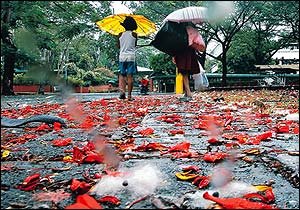The Observer
notes that call centers have become part of the cultural mainstream. It has also "become symbol for the rapid change India is going through," a picture of a nation caught between two eras.
There are around 350,000 workers in this industry, most of them young and college educated. Working in a call center assures one of a higher than minimum wage salary, and is often seen as glamorous, but "for sheer monotony, few office environments can beat the deadening tedium of the call centre, where workers spend long shifts repeating pre-scripted phrases to faceless customers."
Nevertheless, the call center serves as the backdrop for novels, soap operas, and film. Makarand Paranjape of the Jawaharlal Nehru University explains this phenomenon: "Literature is just catching up with social trends - and now we're seeing an attempt to eroticise the industry, an attempt to make it a culturally exciting place, hip and cool. Of course it's a bit of a fantasy: there is nothing glamorous about call centres; they are dehumanising, decultured places."
The Indians have expressed their grief at this situation clearly enough. Varun (or Victor), the lead character in "One Night @ The Call Centre" says: "My friends, I am angry. Because every day I see some of the world's strongest and smartest people in my country. I see all this potential, yet it is all getting wasted. An entire generation up all night, providing crutches for the white morons to run their lives."
I'm not sure about the exact figures, but I think we also have more or less the same number of young people who work in call centers. People see outsourcing as a sunshine industry, nevermind that our young and brilliant people are doing a mind-numbing job. People get paid, they get to speak in an American accent. What more can you ask for, right?
I wonder how long it'll be before we get a film, novel or tv show that uses the call center as a major backdrop. Yeah, there was that Bea Alonzo-John Lloyd movie where Bea is supposed to be a call center agent, but
Now That I Have You never really used that in the story except as a minor detail. There was also
Keka where Katya Santos' character also worked in a call center. I suppose that's how she got to kill people without anyone noticing. Hehe.
So I guess this means the call center thing is still one huge open field. Makes me think of revising an old work set in the dark ages when people still carried pagers and it was a cool, cool thing to own. Weh.







